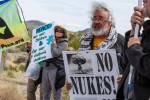In jail for flag burning
In one of its more controversial decisions, the U.S. Supreme Court in 1989 ruled 5-4 that the First Amendment shields from prosecution those who burn the American flag.
The ruling, Texas v. Johnson, inflamed passions on both sides. Ultimately, however, the majority recognized that for freedom of political expression to have any meaning at all, it must include actions that are profoundly unpopular and even offensive.
“Though symbols often are what we ourselves make of them, the flag is constant in expressing beliefs Americans share, beliefs in law and peace and freedom which sustain the human spirit,” wrote Justice Anthony Kennedy in a concurring opinion. “The case here today forces recognition of the costs to which those beliefs commit us. It is poignant but fundamental that the flag protects those who hold it in contempt.”
That was 27 years ago. Agree or disagree, the issue is settled from a legal standpoint.
Yet the Associated Press reported last week that flag desecration laws remain on the books in at least 40 states, including Nevada. Since the high court decision more than a quarter-century ago, lawmakers in just five states — Arkansas, Connecticut, Missouri, Rhode Island and New Hampshire — have repealed their statutes that outlaw burning an American flag.
The issue has returned to the news recently given the nation’s volatile political climate and the protests at both the Republican and Democratic conventions. In addition, an Illinois woman was arrested and jailed on July 4, the news service reports, for burning the Stars and Stripes.
Section 290 of the Nevada Revised Statutes includes language making a criminal out of anyone who “publicly or willfully mutilates, tramples upon, or who tears down or willfully and maliciously removes while owned by others, or defames, slanders or speaks in a contemptuous manner of or otherwise defaces or defiles any of the flags, or ensign, which are public or private property.”
Given the law’s expansive language, an overzealous Nevada prosecutor could use the statute to incarcerate a protester who burned the American flag.
And that’s just the point. As long as these unconstitutional restrictions remain on the books, “innocent people will be arrested,” Ken Paulson, a Middle Tennessee State professor and president of the First Amendment Center, told the AP.
Lawmakers are understandably nervous about backing legislation to eradicate these statutes. But political expediency hardly trumps the nation’s founding document. Texas v. Johnson has been the law of the land for almost three decades. It’s time Nevada law reflected that decision.























